Stress

- Notes
Preparing for the MCAT necessitates a profound comprehension of stress. Understanding the mechanisms of how stress affects physiological and psychological processes, as well as the body’s stress response, equips you with crucial insights into health and disease, vital for excelling on the MCAT and understanding complex biological functions.
Learning Objectives
In studying stress for the MCAT, you should develop an understanding of the physiological and psychological properties of stress, including the mechanisms of the stress response and the impact of stress on various organ systems. Explore the roles of hormones, neurotransmitters, and the feedback mechanisms involved in the stress response. Evaluate how changes in stress levels influence emotional and physical health, facilitating communication within the body and affecting overall well-being. Additionally, understand how these phenomena are foundational to behavioral responses and adaptive mechanisms.
Understanding Stress
Stress is a psychological and physiological response to perceived threats or challenges, leading to emotional strain and various bodily reactions that can affect overall health.
Types of Stress
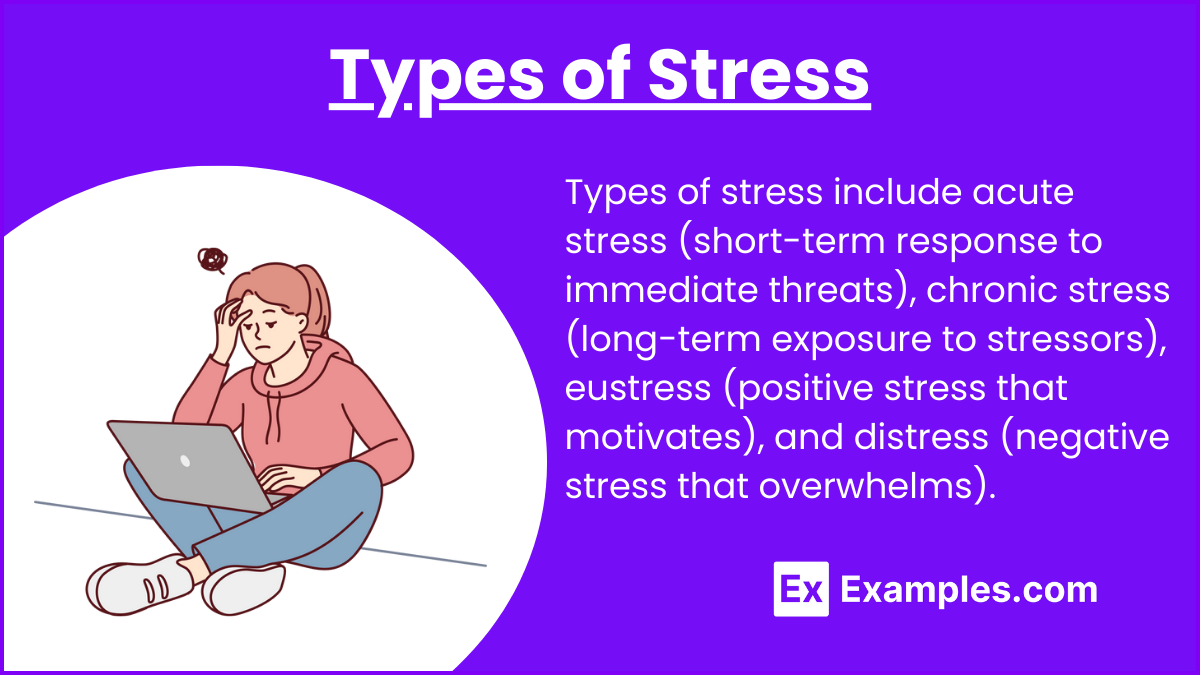
- Acute Stress:
- Short-term response to immediate threats.
- Examples: exams, public speaking, sudden emergencies.
- Can enhance performance and alertness.
- Chronic Stress:
- Long-term exposure to stressors, leading to a constant state of arousal.
- Examples: ongoing job dissatisfaction, relationship problems.
- Associated with various health issues, including anxiety, depression, and cardiovascular diseases.
- Eustress:
- Positive form of stress that can motivate and energize individuals.
- Examples: starting a new job, preparing for a competition.
- Distress:
- Negative form of stress that can lead to anxiety and overwhelm.
- Examples: losing a job, dealing with a serious illness.
The Physiology of Stress
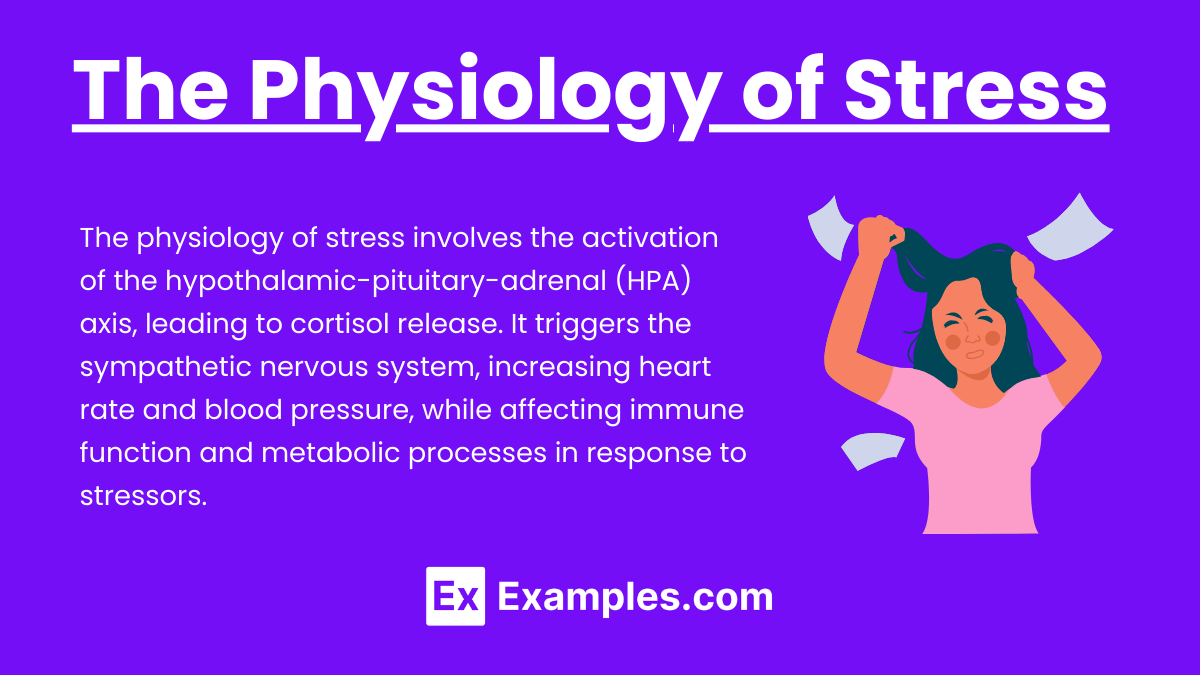
- The Hypothalamic-Pituitary-Adrenal (HPA) Axis:
- Activation of the HPA axis is the primary pathway for stress response.
- Hypothalamus releases corticotropin-releasing hormone (CRH).
- CRH stimulates the Pituitary Gland to release adrenocorticotropic hormone (ACTH).
- ACTH prompts the Adrenal Glands to release cortisol (the stress hormone).
- Cortisol helps mobilize energy and suppresses non-essential functions (e.g., immune response).
- Sympathetic Nervous System (SNS):
- Activates the “fight or flight” response.
- Increases heart rate, blood pressure, and respiration.
- Releases adrenaline and norepinephrine.
- Physical Effects of Stress:
- Increased heart rate and blood pressure.
- Elevated glucose levels for energy.
- Impaired immune function over time.
- Digestive issues, muscle tension, and headaches.
Psychological Effects of Stress
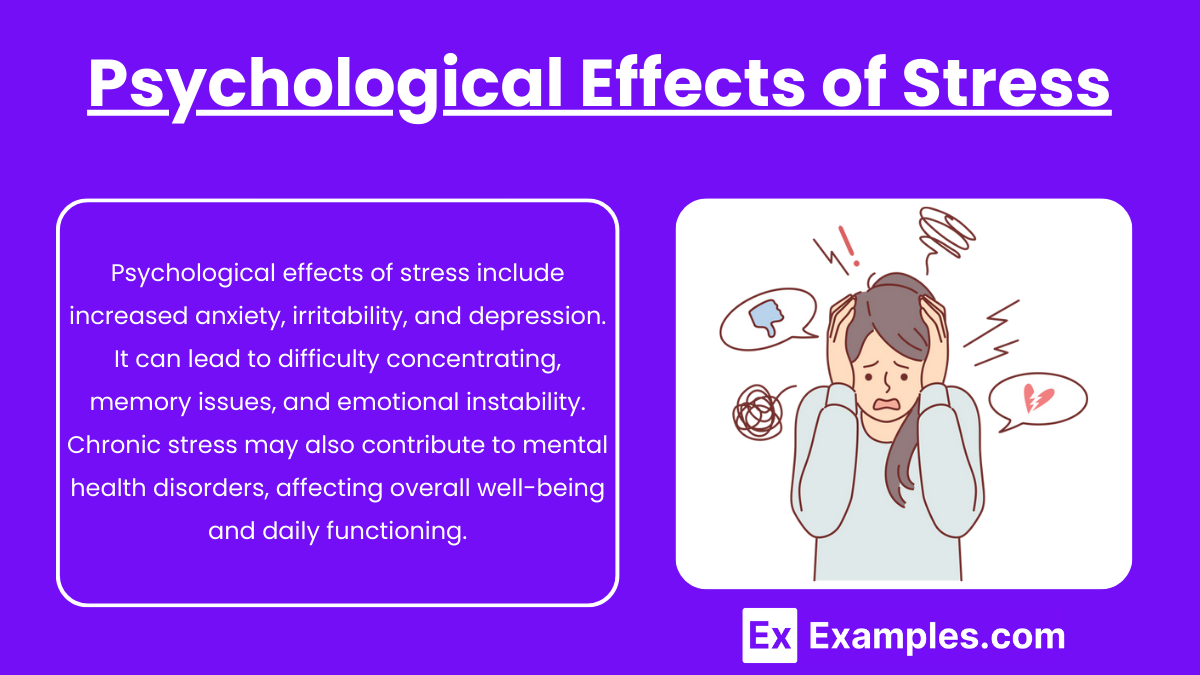
- Emotional Reactions:
- Anxiety, irritability, anger, and sadness.
- Difficulty concentrating and making decisions.
- Behavioral Responses:
- Avoidance or withdrawal from situations.
- Changes in appetite (overeating or under-eating).
- Substance abuse as a coping mechanism.
Coping Mechanisms
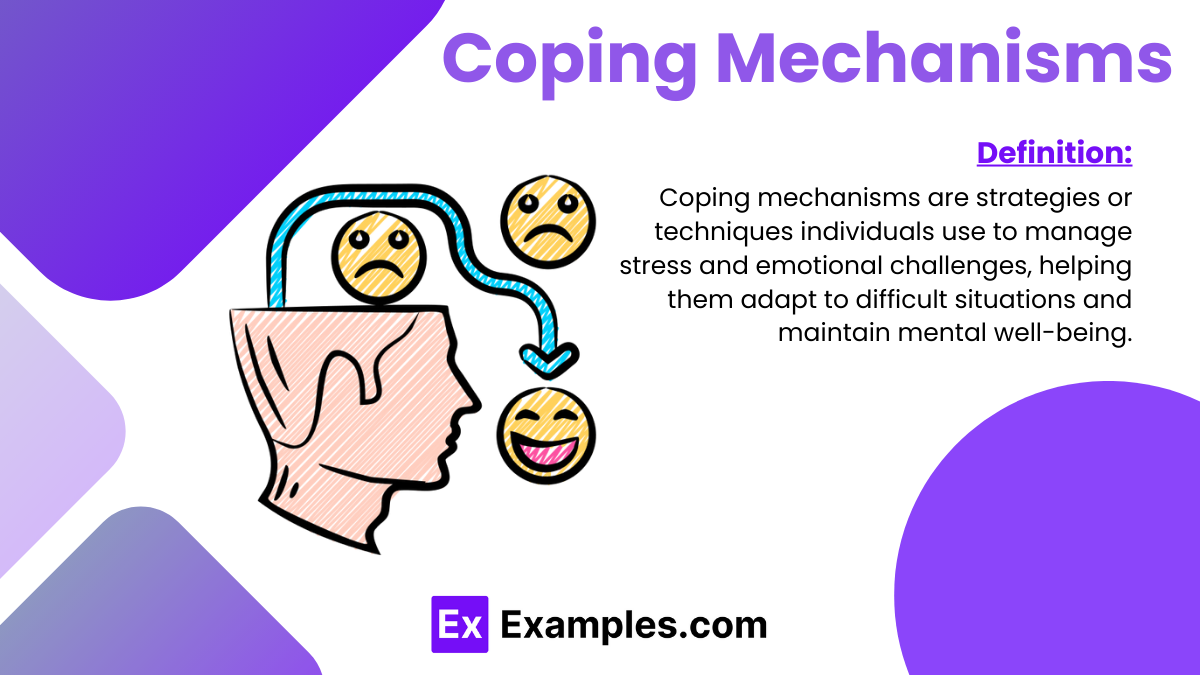
- Problem-Focused Coping:
- Aimed at addressing the source of stress directly.
- Examples: time management, seeking help, planning.
- Emotion-Focused Coping:
- Aimed at managing emotions related to stress.
- Examples: mindfulness, meditation, deep breathing, physical activity.
- Social Support:
- Seeking help from friends, family, or support groups can reduce the impact of stress.
Stress Management Techniques
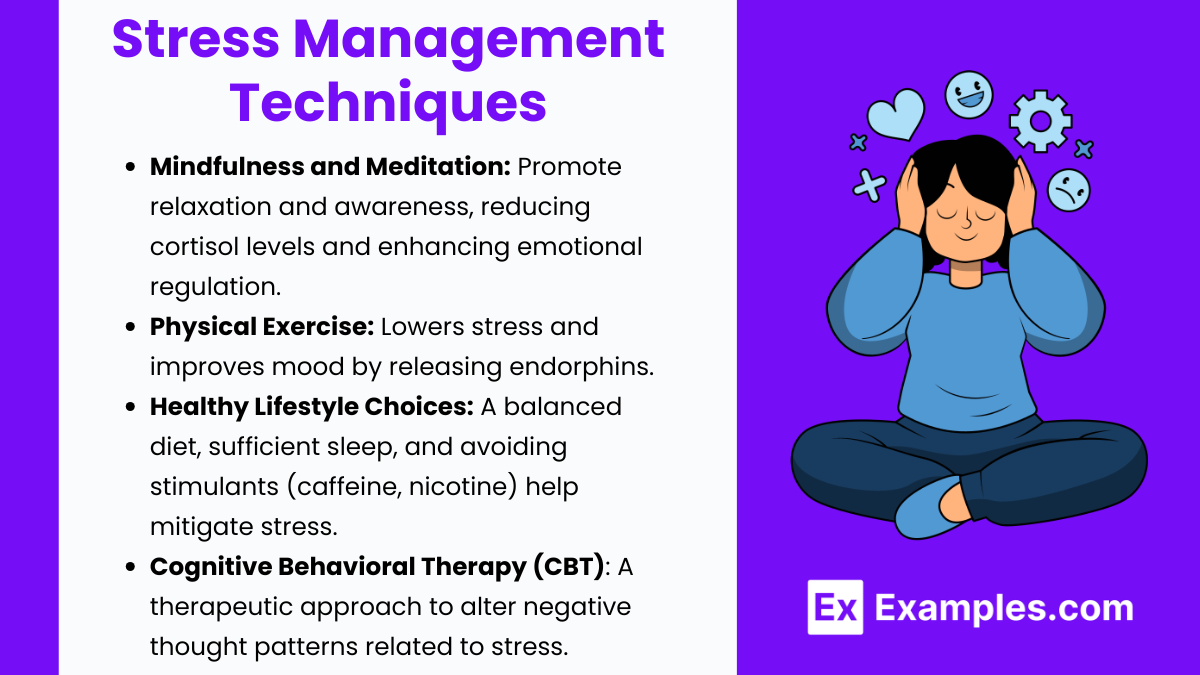
- Mindfulness and Meditation:
- Techniques that promote relaxation and awareness.
- Can reduce cortisol levels and improve emotional regulation.
- Physical Exercise:
- Regular exercise reduces stress and improves mood.
- Releases endorphins, natural stress-relievers.
- Healthy Lifestyle Choices:
- Balanced diet, adequate sleep, and avoiding stimulants (caffeine, nicotine) can mitigate stress.
- Cognitive Behavioral Therapy (CBT):
- A therapeutic approach to change negative thought patterns associated with stress.
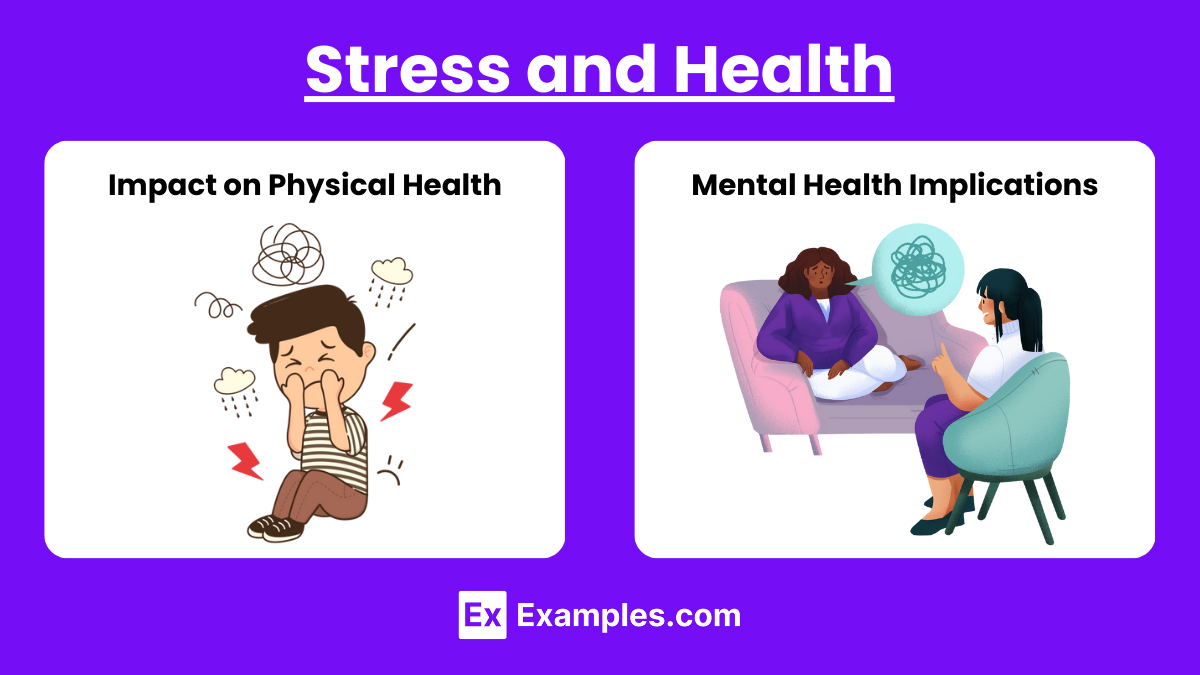
Stress and Health
- Impact on Physical Health:
- Chronic stress can lead to cardiovascular disease, weakened immune response, and gastrointestinal issues.
- Mental Health Implications:
- Increased risk for anxiety disorders, depression, and other psychological disorders.
Examples
Example 1: Acute Stress Response
A student experiences acute stress before a major exam. The body’s fight-or-flight response activates, leading to increased heart rate, heightened alertness, and the release of adrenaline to prepare for performance.
Example 2: Chronic Stress and Health
A professional faces chronic work-related stress, which leads to persistent anxiety and fatigue. Over time, this stress contributes to health issues such as hypertension and weakened immune function.
Example 3: Eustress in Everyday Life
A person feels eustress while preparing for a wedding. This positive stress motivates them to plan and organize effectively, ultimately leading to enjoyment and satisfaction during the event.
Example 4: Impact of Stress on Relationships
Increased stress from financial difficulties can strain relationships. Individuals may become irritable or withdrawn, leading to conflicts and reduced communication with partners and family members.
Example 5: Stress Management Techniques
A person incorporates mindfulness meditation into their routine to manage stress. This practice helps reduce cortisol levels and promotes emotional regulation, allowing them to better cope with daily challenges.
Practice Questions on Stress
Question 1:
Which type of stress is characterized by a positive response that can motivate and enhance performance?
A) Acute Stress
B) Chronic Stress
C) Eustress
D) Distress
Answer: C) Eustress
Explanation: Eustress is a positive form of stress that can motivate individuals and improve performance in challenging situations.
Question 2:
Chronic stress can lead to which of the following health issues?
A) Improved immune function
B) Increased risk of anxiety and depression
C) Enhanced cognitive function
D) Greater physical endurance
Answer: B) Increased risk of anxiety and depression
Explanation: Chronic stress negatively impacts mental health, increasing the risk of anxiety disorders and depression due to prolonged physiological strain on the body.
Question 3:
Which of the following is an example of emotion-focused coping?
A) Seeking social support
B) Planning and organizing tasks
C) Engaging in mindfulness meditation
D) Setting specific goals to address stressors
Answer: C) Engaging in mindfulness meditation
Explanation: Emotion-focused coping aims to manage emotions related to stress, and mindfulness meditation helps individuals regulate their emotional responses.
Preparing for the MCAT necessitates a profound comprehension of stress. Understanding the mechanisms of how stress affects physiological and psychological processes, as well as the body's stress response, equips you with crucial insights into health and disease, vital for excelling on the MCAT and understanding complex biological functions.
Learning Objectives
In studying stress for the MCAT, you should develop an understanding of the physiological and psychological properties of stress, including the mechanisms of the stress response and the impact of stress on various organ systems. Explore the roles of hormones, neurotransmitters, and the feedback mechanisms involved in the stress response. Evaluate how changes in stress levels influence emotional and physical health, facilitating communication within the body and affecting overall well-being. Additionally, understand how these phenomena are foundational to behavioral responses and adaptive mechanisms.
Understanding Stress
Stress is a psychological and physiological response to perceived threats or challenges, leading to emotional strain and various bodily reactions that can affect overall health.
Types of Stress

Acute Stress:
Short-term response to immediate threats.
Examples: exams, public speaking, sudden emergencies.
Can enhance performance and alertness.
Chronic Stress:
Long-term exposure to stressors, leading to a constant state of arousal.
Examples: ongoing job dissatisfaction, relationship problems.
Associated with various health issues, including anxiety, depression, and cardiovascular diseases.
Eustress:
Positive form of stress that can motivate and energize individuals.
Examples: starting a new job, preparing for a competition.
Distress:
Negative form of stress that can lead to anxiety and overwhelm.
Examples: losing a job, dealing with a serious illness.
The Physiology of Stress

The Hypothalamic-Pituitary-Adrenal (HPA) Axis:
Activation of the HPA axis is the primary pathway for stress response.
Hypothalamus releases corticotropin-releasing hormone (CRH).
CRH stimulates the Pituitary Gland to release adrenocorticotropic hormone (ACTH).
ACTH prompts the Adrenal Glands to release cortisol (the stress hormone).
Cortisol helps mobilize energy and suppresses non-essential functions (e.g., immune response).
Sympathetic Nervous System (SNS):
Activates the "fight or flight" response.
Increases heart rate, blood pressure, and respiration.
Releases adrenaline and norepinephrine.
Physical Effects of Stress:
Increased heart rate and blood pressure.
Elevated glucose levels for energy.
Impaired immune function over time.
Digestive issues, muscle tension, and headaches.
Psychological Effects of Stress

Emotional Reactions:
Anxiety, irritability, anger, and sadness.
Difficulty concentrating and making decisions.
Behavioral Responses:
Avoidance or withdrawal from situations.
Changes in appetite (overeating or under-eating).
Substance abuse as a coping mechanism.
Coping Mechanisms

Problem-Focused Coping:
Aimed at addressing the source of stress directly.
Examples: time management, seeking help, planning.
Emotion-Focused Coping:
Aimed at managing emotions related to stress.
Examples: mindfulness, meditation, deep breathing, physical activity.
Social Support:
Seeking help from friends, family, or support groups can reduce the impact of stress.
Stress Management Techniques

Mindfulness and Meditation:
Techniques that promote relaxation and awareness.
Can reduce cortisol levels and improve emotional regulation.
Physical Exercise:
Regular exercise reduces stress and improves mood.
Releases endorphins, natural stress-relievers.
Healthy Lifestyle Choices:
Balanced diet, adequate sleep, and avoiding stimulants (caffeine, nicotine) can mitigate stress.
Cognitive Behavioral Therapy (CBT):
A therapeutic approach to change negative thought patterns associated with stress.

Stress and Health
Impact on Physical Health:
Chronic stress can lead to cardiovascular disease, weakened immune response, and gastrointestinal issues.
Mental Health Implications:
Increased risk for anxiety disorders, depression, and other psychological disorders.
Examples
Example 1: Acute Stress Response
A student experiences acute stress before a major exam. The body’s fight-or-flight response activates, leading to increased heart rate, heightened alertness, and the release of adrenaline to prepare for performance.
Example 2: Chronic Stress and Health
A professional faces chronic work-related stress, which leads to persistent anxiety and fatigue. Over time, this stress contributes to health issues such as hypertension and weakened immune function.
Example 3: Eustress in Everyday Life
A person feels eustress while preparing for a wedding. This positive stress motivates them to plan and organize effectively, ultimately leading to enjoyment and satisfaction during the event.
Example 4: Impact of Stress on Relationships
Increased stress from financial difficulties can strain relationships. Individuals may become irritable or withdrawn, leading to conflicts and reduced communication with partners and family members.
Example 5: Stress Management Techniques
A person incorporates mindfulness meditation into their routine to manage stress. This practice helps reduce cortisol levels and promotes emotional regulation, allowing them to better cope with daily challenges.
Practice Questions on Stress
Question 1:
Which type of stress is characterized by a positive response that can motivate and enhance performance?
A) Acute Stress
B) Chronic Stress
C) Eustress
D) Distress
Answer: C) Eustress
Explanation: Eustress is a positive form of stress that can motivate individuals and improve performance in challenging situations.
Question 2:
Chronic stress can lead to which of the following health issues?
A) Improved immune function
B) Increased risk of anxiety and depression
C) Enhanced cognitive function
D) Greater physical endurance
Answer: B) Increased risk of anxiety and depression
Explanation: Chronic stress negatively impacts mental health, increasing the risk of anxiety disorders and depression due to prolonged physiological strain on the body.
Question 3:
Which of the following is an example of emotion-focused coping?
A) Seeking social support
B) Planning and organizing tasks
C) Engaging in mindfulness meditation
D) Setting specific goals to address stressors
Answer: C) Engaging in mindfulness meditation
Explanation: Emotion-focused coping aims to manage emotions related to stress, and mindfulness meditation helps individuals regulate their emotional responses.

